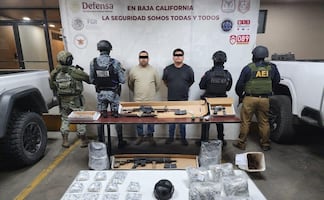Federal and state authorities arrested the leader of the Santa Rosa de Lima Cartel on August 2. José Antonio Yépez Ortiz, also known as “El Marro”, wreaked havoc in Guanajuato in recent years. The local gang is involved in fuel theft , kidnapping , and extortion .
Days after his arrest, alleged members of the Jalisco New Generation Cartel ( CJNG ) released a video to say the cartel is thankful for El Marro’s arrest and that bloody criminal organization will guarantee peace and security in Guanajuato.
In the video, the CJNG explains it launched a war against “El Marro” because he killed innocents and because he is a bad person.
“We know that there are still people from this gang of killers of innocents,” a cartel spokesman says in the video, a reference to remaining Santa Rosa Cartel members. “They will also fall. The best thing they can do is run.”
Recommended
: Mexican authorities analyze video of CJNG gunmen to determine its authenticity
The CJNG’s “elite” group tells business owners extortions are over and says those who were displaced by violence can now return home.
This is not the first video released by the CJNG. Weeks ago, the bloody cartel released a video that shows members of an “elite” group who may have had military training. The Mexican government said the video was filmed near the border of Jalisco and Guanajuato. It showed around 75 gunmen dressed in military-style uniforms with a dozen homemade armored pickup trucks, an anti-aircraft gun, nine belt-fed machine guns, 10 sniper rifles, six grenade launchers, and 54 assault rifles.
José Antonio Yépez Ortiz was recently transported to a maximum-security prison known as “El Altiplano.” He is held on fuel theft, organized crime, and kidnapping charges.
In recent years, the Santa Rosa de Lima Cartel and the CJNG engaged in a brutal war to control Guanajuato. In a video released by the Santa Rosa Cartel, El Marro raised the possibility of allying with the Sinaloa Cartel in a bid to defeat the CJNG.
The war against the CJNG
David Rogel Figueroa, “El Güero,” founded the Santa Rosa de Lima Cartel in 2014 and their main criminal activity was fuel theft.
According to federal authorities, the criminal organization gained notoriety when “El Marro” became the cartel boss. In 2017, it launched a war against the Jalisco Nueva Generación Cartel to control fuel theft, drug sales, kidnapping, and extortion in the area.
According to recent intelligence reports, the CJNG operates in Guanajuato municipalities, including León and Salamanca. It is fighting to control Cortazar, Celaya, Apaseo el Grande, and Apaseo el Alto.
Federal and state authorities indicated that the CJNG is involved drug sales, kidnapping, and extortion in León, Silao, Guanajuato, Irapuato, and Salamanca; nevertheless, the bloody cartel is not interested in taking over fuel theft.
Recommended
: President López Obrador stands by his no-war approach after the CJNG released shocking video
Cartel Jalisco Nueva Generación
The CJNG was originally known as the Zeta Killers and first appeared in 2011, with the display of the bodies of 35 alleged members of Los Zetas. Although the criminal organization is based in Jalisco, it also operates in Colima, Michoacán, the state of Mexico, Guerrero, and Guanajuato.
The Cártel Jalisco Nueva Generación allegedly served as an armed group for the Sinaloa Cartel until 2013.
In 2015, the Mexican government declared CJNG one of the most dangerous cartels in the country. In October 2016, the U.S. Department of the Treasury described the group as one of the world’s “most prolific and violent drug trafficking organizations.”
According to some analysts, the CJNG has operations throughout the Americas, Asia, and Europe.
Moreover, the brutal Mexican cartel has been linked to several mass graves in southwestern Mexico and shot down an army helicopter in 2015.
The Jalisco New Generation Cartel distributes drugs in Los Angeles, New York, Chicago, and Atlanta. Furthermore, this drug trafficking organization is “one of the most powerful and fastest-growing cartels in Mexico and the United States” as it has a presence in at least 24 of 32 Mexican states.
This drug cartel is characterized by its rapid expansion and its willingness to “engage in violent confrontations with Mexican Government security forces and rival cartels.”
Noticias según tus intereses
[Publicidad]
[Publicidad]














